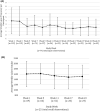Dietary lapses are associated with meaningful elevations in daily caloric intake and added sugar consumption during a lifestyle modification intervention
- PMID: 35949281
- PMCID: PMC9358737
- DOI: 10.1002/osp4.587
Dietary lapses are associated with meaningful elevations in daily caloric intake and added sugar consumption during a lifestyle modification intervention
Abstract
Objective: Lapses from the dietary prescription in lifestyle modification interventions for overweight/obesity are common and impact weight loss outcomes. While it is expected that lapses influence weight via increased consumption, there are no studies that have evaluated how dietary lapses affect dietary intake during treatment. This study examined the association between daily lapses and daily energy and macronutrient intake during a lifestyle modification intervention.
Methods: This study used an intensive longitudinal design to observe participants throughout a 6-month lifestyle modification intervention. Participants (n = 32) were adults with overweight/obesity (body mass index 25-50 kg/m2) and a diagnosed cardiovascular disease risk factor (e.g., hypertension) with a desire to lose weight. Participants underwent a gold-standard individual in-person lifestyle modification protocol consisting of 3 months of weekly sessions with 3 months of monthly sessions. Each participant's dietary prescription included a calorie target range that was based on their starting weight. Participants completed ecological momentary assessment (EMA; repeated daily smartphone surveys) every other week to self-report on dietary lapses and telephone-based 24-h dietary recalls every 6 weeks.
Results: On days with EMA and recalled intake (n = 210 days), linear mixed models demonstrated significant associations between daily lapse and higher total daily caloric intake (B = 139.20, p < 0.05), more daily grams of added sugar (B = 16.24, p < 0.001), and likelihood of exceeding the daily calorie goal (B = 0.89, p < 0.05). The associations between daily lapse and intake of all other daily macronutrients were non-significant.
Conclusions: This study contributes to literature suggesting that dietary lapses pose a threat to weight loss success. Results indicate that reducing lapse frequency could reduce overall caloric intake and added sugar consumption.
Keywords: 24‐h dietary recall; adherence; behavioral weight loss; dietary intake; dietary lapses; ecological momentary assessment.
© 2021 The Authors. Obesity Science & Practice published by World Obesity and The Obesity Society and John Wiley & Sons Ltd.
Conflict of interest statement
Dr. Thomas participates in a scientific advisory board and serves as a paid consultant for Lumme Health.
Figures
References
-
- Heymsfield SB, Wadden TA. Mechanisms, pathophysiology, and management of obesity. N. Engl J Med. 2017;376(3):254‐266. - PubMed
-
- Curry SJ, Krist AH, Owens DK, et al. Behavioral weight loss interventions to prevent obesity‐related morbidity and mortality in adults: US Preventive Services Task Force recommendation statement. JAMA. 2018;320(11):1163‐1171. - PubMed
Grants and funding
LinkOut - more resources
Full Text Sources
Research Materials


